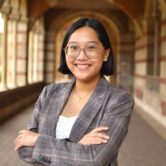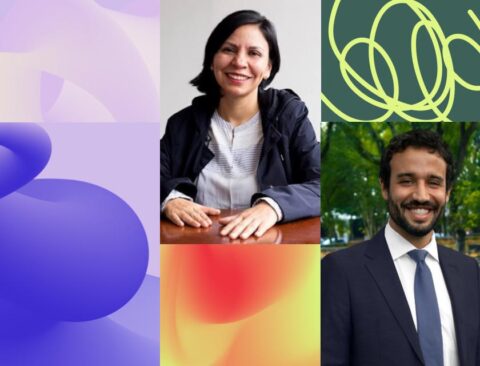
Yoyo Wong
Executive Assistant

S. Priya Morley
Project Advisor, Global Justice Clinic; Director, Racial Justice Initiative, Bernstein Institute for Human Rights
Global Justice Clinic
Before joining the Bernstein Institute, Priya was on the faculty at UCLA Law as Director of the International Human Rights Clinic and Racial Justice Policy Counsel at the Promise Institute for Human Rights, where she led academic, advocacy, and policy initiatives at the intersection of racial justice and critical approaches to human rights. She was affiliated with the Critical Race Studies and International and Comparative Law Programs at UCLA Law, as well as the UCLA Latin American Institute.
Priya was previously an Arthur Helton Global Human Rights Fellow at NYU Law, researching discrimination against Black African and Haitian migrant women in Mexico, and she supervised students in the Global Justice Clinic’s Caribbean Climate Justice Initiative, with which she continued to collaborate while at UCLA Law.
A Canadian attorney, Priya previously worked in employment law, public law, and human rights litigation at WeirFoulds LLP and clerked at the Divisional Court, Superior Court of Justice of Ontario. She also worked with the UN Team of Experts on Rule of Law and Sexual Violence in Conflict and several civil society organizations, including the European Centre for Constitutional and Human Rights (ECCHR), Equality Effect, and Equitas International Centre for Human Rights Education.
Priya holds an LLM in International Legal Studies from NYU Law, law degrees from McGill University Faculty of Law, and a BA from the University of British Columbia. She is completing a PhD in Law at the Allard School of Law at UBC. Her research sits at the intersection of race, gender, and migration.
HUMAN RIGHTS MOVEMENT
Improving and maintaining well-being is essential to individual health, to organizational functioning, and to the sustainability and effectiveness of the human rights field as a whole. There are many concrete, immediately actionable reforms that are achievable in the near-term and which address a variety of causes of distress, or which can support efforts to transform the field over the long term. Such steps should be taken while the human rights field works toward deep transformation.
Human rights advocacy can be a source of significant joy, purpose, political agency, belonging, and community. Yet advocates can also experience harms, and trauma in their efforts to advance justice and equality, including those caused by heavy workloads, time pressures, discrimination and bullying in the workplace, vicarious exposure to trauma and human rights abuse, and direct experience of threats and attacks. Advocates can experience suffering, sometimes very severe, as a result, including demotivation, alienation, anxiety, fear, depression, and post-traumatic stress disorder. How advocates experience their work and any resulting harms can vary widely, and may be highly contextual and culturally specific.
Improving and maintaining well-being is essential to individual health, to organizational functioning, and to the sustainability and effectiveness of the human rights field as a whole.
Positively transforming mental health and well-being in the human rights field will require significant reforms and both structural changes and close attention to the contextually-specific needs of individual advocates and organizations. The causes and dynamics at play are complex, and there are no quick fixes that can address the cultural shifts required. As efforts are taken to improve well-being, it is important that the field avoids tick-the-box or commodified approaches. Improving the wellbeing of human rights advocates requires a holistic response and a movement-wide prioritization of well-being, with careful attention to context, culture, and the diverse needs of advocates and organizations.
Recognition of the deeply-rooted problems requiring radical change or of the complexities of the issues and the difficulty of defining a clear set of recommendations applicable across the board should not operate as an excuse to take no action now to improve well-being. There are many concrete, immediately actionable reforms that are achievable in the near-term and which address a variety of causes of distress, or which can support efforts to transform the field over the long term. Such steps should be taken while the human rights field works toward deep transformation. Some of these steps include the following recommended actions, which are drawn from our research with advocates around the world.
CLIMATE AND ENVIRONMENT
Indigenous peoples are experiencing a rush of interest in their lands and territories from actors involved in carbon markets. Many indigenous communities have expressed that to make informed decisions about how to engage with carbon markets, they need accessible information about what these markets are, and how participating in them may affect their rights.
In response to this demand for information, the Global Justice Clinic and the Forest Peoples Programme have developed a series of introductory materials about carbon markets. The materials were initially developed for GJC partner the South Rupununi District Council in Guyana and have been adapted for a global audience.
The explainer materials can be read in any order:
The Center offers opportunities for scholars and practitioners to spend up to one year in residence working on projects related to our thematic areas and collaborating with staff members as well as with other visiting practitioners and scholars.

2024-2025
Patricia Tobón Yagarí
Patricia is a distinguished practitioner in residence. She is an Indigenous lawyer of the Embera people of Colombia & former General Director of the Unit for the Attention and Integral Reparation of Victims in Colombia.
Lucas Cravo de Oliveira
Lucas Cravo is a scholar in residence awarded the Doctoral Dissertation Research Award program of the Fulbright Commission Brazil. He is a PhD candidate in Law at the University of Brasília (2022–present) and holds a Master’s degree in Law from the University of Brasília (2018–2020), with a technical visit period at Flinders University, funded by the CAPES Academic Excellence Program.
Distinguished Practitioners in Residence
Participants in this program are practitioners from around the world who have made outstanding contributions to human rights and global justice as advocates, policy makers, social movement leaders, international agency officers, non-profit leaders, journalists and other relevant roles.
Please note that the Center is not currently accepting applications for this program.
Global Fellows at NYU School of Law
The Center accepts up to three fellows per year through the NYU Law Global Fellows Program. Fellows interested in applying for this opportunity should refer to the program’s guidelines, funding deadlines, and application process and indicate their interest in being housed at the Center.
Each year, the Center selects a cohort of incoming NYU Law LLM students to take part in the Transitional Justice Leadership Program.
Developed in consultation with prominent figures in the transitional justice field, the program provides an opportunity for NYU Law LLM students to engage through coursework, scholarship, and internships with the Center’s Prevention Project which:
This program offered me an unmatched opportunity to develop my expertise in this vibrant field and to move my career toward the next stages.
Jorge Carlos Peniche Baqueiro, Transitional Justice Scholar 2016-2017
Senior Fellow and Professor de Greiff who served as UN Special Rapporteur on the promotion of truth, justice, reparation and guarantees of non-recurrence (May 2012-May 2018) leads the Transitional Justice Program and teaches the associated course.
Students not selected for the program may still register for the course through the normal registration process; however, as with all NYU Law courses, enrollment for those outside the program is not guaranteed.
Following the orientation session, scholars will take leadership in organizing, leading and hosting monthly meetings at the Center. These will take the form of discussions with experts and writing workshops, as well as other activities.
Scholarship is vital to preparing students for careers in transitional justice. Scholars are expected to develop original works of legal scholarship to submit to the annual Emerging Scholars Conference, a forum that provides students with the unique opportunity to receive detailed feedback from experts and peers in order to prepare work of publishable quality.
In addition to other information, applicants are required to submit the following materials:

Firstname Last
Job title
Program
Lorem ipsum dolor sit amet, consectetur adipiscing elit, sed do eiusmod tempor incididunt ut labore et dolore magna aliqua. Ut enim ad minim veniam, quis nostrud exercitation ullamco laboris nisi ut aliquip ex ea commodo consequat. Duis aute irure dolor in reprehenderit in voluptate velit esse cillum dolore eu fugiat nulla pariatur. Excepteur sint occaecat cupidatat non proident, sunt in culpa qui officia deserunt mollit anim id est laborum.
Since 2002, the International Law and Human Rights (ILHR) Fellowship Program offers enrolled NYU School of Law students an opportunity to complete a specialized training program in international law and undertake a summer internship through a matching process at a leading institution or organization. Students are also encouraged to complete a research project growing out of that work experience.
Together with coursework, topical events and informal opportunities for networking, this program:
The fellowship is undertaken with funding support from the Public Interest Law Center, and in partnership with the Institute for International Law and Justice.
My fellowship transformed my commitment to human rights from an abstract ideal into a tangible pursuit. Through this hands-on experience, I was exposed to the real-world complexities of advocacy work, challenging my assumptions and the theory we learned in the classroom. It wasn’t just a fellowship; it was the bridge between aspiration and action.
Jasper Kamradt, ILHR Fellow 2024
A 10-12 week funded internship to take place either in Summer or Fall semesters at an organization working in human rights or international law.
Students selected for the ILHR Fellowship will receive a stipend administered by the Public Interest Law Center.
Depending on the fellowship’s track and placement, preparation and training in the form of course requirements and a series of not-for-credit seminars in the Spring semester are required.
Fellows present and participate in the Center’s Emerging Scholars Conference reflecting on their engagements and learning experiences. They are also encouraged to undertake a research project inspired by the fellowship on an international law or human rights issue. Parameters to be determined in agreement with academic supervisors.
Applicants must:
In addition to other information, applicants are required to submit the following materials:
STUDENTS
Human Rights Scholars
The Center provides current NYU School of Law students with an opportunity to contribute to our activities as research assistants, and be integrated into our community of staff, faculty, visiting scholars, and students through invitations to events, research workshops, and expert convening.
Whether during one semester or through the academic year, the Human Rights Scholars work with faculty and staff to further the Center’s research agenda and to support the design and implementation of our projects, workshops, and programs including legal research, writing and advocacy.
The Center houses many initiatives; the projects recruiting scholar positions are listed in a document during the recruitment cycle.
Each scholar will work with a designated Center faculty and staff to further our line of work, and support the design and implementation of the relevant projects, workshops, and other programming.
Scholarship is vital to preparing students for careers in human rights. Students:
Applicants must:
The program begins in the Fall semester and continues through the academic year.
Human Rights Scholars at the Center will be:
Workloads will vary by project, and will be assigned on an as-needed basis. All applicants should be prepared to contribute:
The following documents will be required to be submitted via an application form:
The Center hosts an internship program each Summer providing NYU and non-NYU students or recent law graduates with an opportunity to contribute to our activities as research assistants, and be integrated into our community of staff, faculty, visiting scholars, and students through invitations to events, research workshops, and expert convening.
Over 10 weeks from May to August, the summer interns will:
The Center houses many initiatives; the projects recruiting intern positions will be shared including a detailed scope of work.
Each scholar will work with a designated Center faculty and staff to further our line of work, and support the design and implementation of the relevant projects, workshops, and other programming.
The Summer Internship program is open to NYU and non-NYU Law students or recent law graduates. Applicants must:
The Summer Internship program will be in session from May to August.
As this internship is unpaid, candidates are encouraged to seek funding from their Public Interest Law Centers and other sources.
The following documents will be required to be submitted via an application form:
Created by Matchbox Creative
New York University School of Law | Center of Human Rights and Global Justice | Accessibility | All rights reserved. © 2024